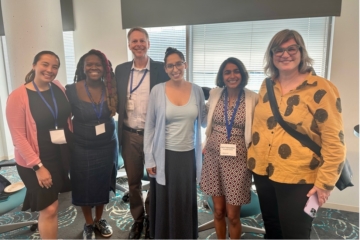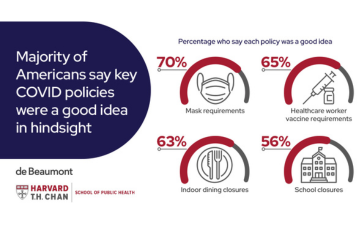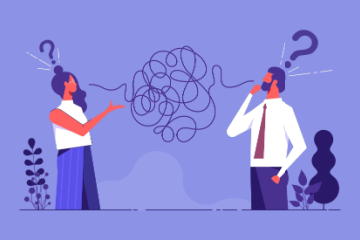The de Beaumont Foundation’s Speaker Series highlights leaders in public health practice, advocacy, policymaking, and other related fields.
Public health professionals are often tasked with working across silos and aisles in the pursuit of community health — something Abdul El-Sayed, MD, DPhil, understands as a public health leader with political experience. The former health commissioner for the city of Detroit, who ran for governor of Michigan in 2018, is now a political commentator for CNN, where he champions health and serves as a voice for reason and science during the COVID-19 pandemic.
His latest book, Healing Politics: A Doctor’s Journey Into the Heart of Our Political Epidemic, explores what El-Sayed has described as an “epidemic of insecurity” across governmental and economic systems that have widened the disparities that have surfaced in the pandemic. Shortly before Election Day, El-Sayed spoke to de Beaumont staff about achieving empathy and understanding in a politically turbulent environment and what public health must do to withstand the tides.
Stay to Fight Tomorrow
As a former gubernatorial candidate who has been a surrogate for Senator Bernie Sanders and served on the Biden-Sanders Unity Task Force to develop policy recommendations on healthcare and other issues, El-Sayed has worked alongside colleagues with a range of political views. That collaboration often requires keeping in mind what is necessary for the greater good, not just achieving wins in the short term.
“People want politics to be this canvas on which they write their moral code, and the problem is that politics is not that way,” he said. “Politics is a hard, bruising business about the ascent of power, and you want folks who are going to obtain power to leverage it in a way that you believe it needs to be used.” He added, “When we get too ideological about what we want our politics to be, we forget the fact that there is a responsibility to do something in the here and now. It’s not a perfect canvas.”
His advice for those who are passionate about their beliefs is to focus on building relationships and remembering “that it’s not about us, it’s about the people we serve and what’s good for them. And sometimes that means staying to fight tomorrow.”
Find Empathy Behind the Fear
El-Sayed believes that behind hatred, there is often fear that needs to be understood. And that begins by asking why people are afraid. “I’m not willing to buy that that people are just born hateful or people are born fearful,” he said. “I believe that people are made hateful and made fearful, and that those two things reinforce each other, and I think if you’re serious about a politics of healing, then it takes meeting people where they are and helping them to move to where they need to be.”
…if you’re serious about a politics of healing, then it takes meeting people where they are and helping them to move to where they need to be.
He explained that fear has stemmed from a breakdown in institutions that have long brought people together. Further, algorithms on social media that further segregate people by extremes, “rather than actually sitting with folks with beliefs that are disagreeable to you, but also being forced to watch them interact with their kids or talk lovingly about their parents or think about love lost or gained or all the things that make us people.”
So what can bring people together? The answer lies in “reintegrating our society around the things that make us human beyond the things that make us political,” El-Sayed said. “And if we can do that, I believe that our future is a lot more secure, and if we can’t, I worry that this is going to continue.”
Target Misinformation, Not Its Victims
In an era of rampant misinformation, it is critical to target the falsehoods, but also to have compassion for people who have been manipulated by them. “We have to differentiate between the mis-informants and the misinformed,” El-Sayed said. He explained that “mis-informants need to be actively addressed, engaged with, and fought, but…the misinformed are often…susceptible to misinformation because of fear,” finding affirmation in conspiracies.
“There is a level of empathy that we have to have with the people who are susceptible to this information,” he said, “and we have to be good at addressing the fears that drive that misinformation, or their susceptibility to that misinformation, even as we’re countering the misinformation itself.” The goal is to target those who profit from spreading misinformation, not to attack the misinformed.
Be Bold in Uplifting Public Health
Public health’s “brand problem,” being notoriously invisible except in times of disaster, has never been as apparent as during the COVID-19 pandemic, El-Sayed said. The workforce can use what he called a “positivist public health message,” highlighting the various ways that public health leads in communities and positioning workers as the heroes of their stories.
Public health professionals need to be comfortable saying, “You will watch us protect people from lead, you will watch us make sure that people aren’t wheezing because they have asthma, you will watch us go after the dirty restaurant or the school that doesn’t meet code.” He added, “You will see us everywhere, because ubiquity itself is a branding strategy.”
That attitude is also key in communicating the unique value of public health in relation to healthcare, he said. “When healthcare goes wrong, it costs a lot of money and people get hurt and that should never happen, so we need to reform healthcare,” he said. “But when public health goes wrong, your whole damn society drops right to its knees, and we can’t let that happen again.”





